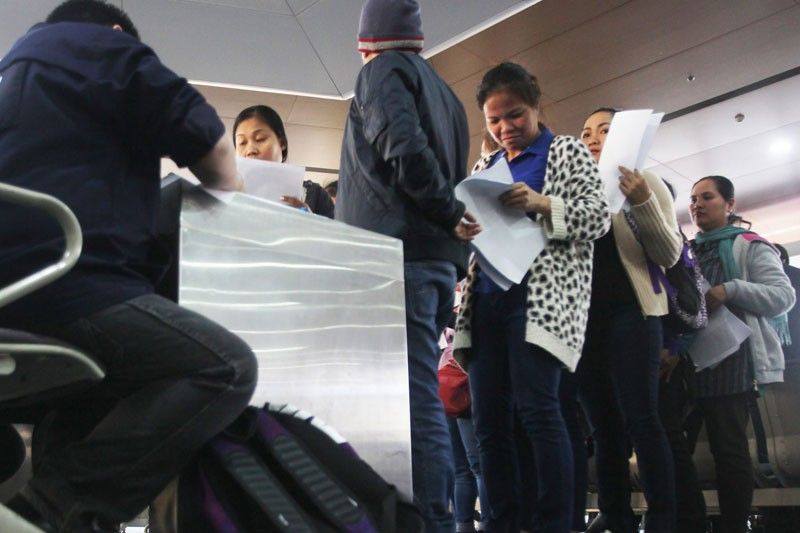US stops issuing new work visas to Filipinos

MANILA, Philippines — Filipinos would not be issued two types of US work visas until Jan. 18 next year, due to concerns over human trafficking and overstaying raised by the US Department of Homeland Security (DHS).
In a notice issued over the weekend, the DHS said the Philippines had been dropped from the list of countries eligible for H-2A/H-2B work visas.
The Department of Foreign Affairs (DFA) said the Philippines is ready to work with the US in addressing the issues.
Malacañang is not ruling out an appeal, but said it would rather let the DFA work it out first with the US embassy.
H-2A visas are given to foreign agricultural workers in the US, while H-2B visas are granted to skilled and unskilled workers. The restriction took effect last Jan. 19.
“In FY 2017, DHS estimated that nearly 40 percent of H-2B visa holders from the Philippines overstayed their period of authorized stay,” the DHS said in its notice published in the Federal Register.
Also stricken off the list were the Dominican Republic and Ethiopia.
Among US diplomatic posts across the globe, the US embassy in Manila issues the greatest number of T-derivative visas (T-2, T-3, T-4, T-5, T-6), which are reserved for certain family members of principal T-1 nonimmigrants (victims of a severe form of trafficking in persons).
The US embassy in Manila issued approximately 40 percent of the total T-derivative visas issued worldwide from 2014 to 2016.
A recent review of certain T-1 status recipients, whose spouses were issued T-2 visas in the same period, showed approximately 60 percent trafficked to the US on H-2B visas.
“DHS and DOS (Department of State) are concerned about the high volume of trafficking victims from the Philippines who were originally issued H-2B visas and the potential that continued H-2B visa issuance may encourage or serve as an avenue for future human trafficking from the Philippines,” the statement said.
“DHS and DOS also believe that these overstay and human trafficking concerns are severe enough to warrant removal from the H-2A visa program as well,” it added.
“The Philippines’ continued inclusion creates the potential for abuse, fraud and other harm to the integrity of the H-2A or H-2B visa programs,” it pointed out.
The DFA reminded Filipinos abroad, particularly those in the US, to follow immigration rules and avoid staying beyond what is allowed by their visas.
“As visa issuances are a country’s prerogative, the DFA notes the concerns that led the DHS to arrive at its decision,” the DFA said in a statement.
“Nonetheless, the Philippines is open to the possibility of working with the United States in addressing these issues, as it has previously done so with similar concerns involving the Filipino community there,” it said.
Presidential spokesman Salvador Panelo said there is a need first to know whether there is basis for the US move. “If we can see that there is no basis, then we will ask for a reconsideration – but that’s the job again as I said of DFA and the US ambassador,” he said.
“Now, with respect to this particular issue, let us wait and let us have the DFA as well as the ambassador to the US take care of that initially, because that’s their turf,” he said.
“If that is the law in the US and if there were violations then we have to respect if they have basis for that. We will only react if our workers are being mistreated, maltreated or being discriminated against but if they violated laws of the US, then they have to face the music,” Panelo said.
On the issue of human trafficking, Panelo expressed the opinion that the Philippine government cannot intervene in the way the US tackles the matter.
Asked if the Palace shares the opinion of the DHS that the Philippine government is not doing enough to address human trafficking, Panelo said on the contrary, the administration is doing its part in enforcing anti-trafficking measures.
“What we can do is to do our own controls here,” he said.
Panelo added there are other countries where Filipinos can look for greater opportunities. – with Christina Mendez
- Latest
- Trending
































